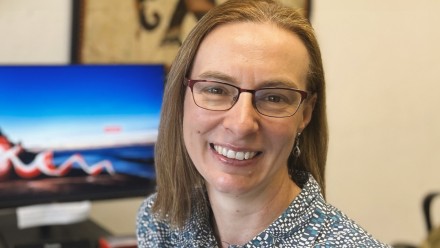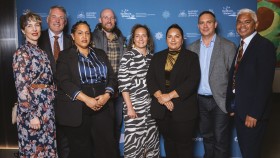Beating COVID-19 is not about a vaccine, it’s about equality and trust
Share
The race to generate a successful vaccine against COVID-19 has seen institutions across the globe scramble in a bid for first place. Governments are paying to secure the rights to vaccines that aren’t yet produced, let alone proven. This has sparked a heated debate about who gets the vaccine first. But a more fundamental conversation regarding equality, community and trust is needed.
Some of the world’s finest epidemiologists debated this topic in a panel hosted discussion in the 2020 ANU Crawford Leadership Forum – Big Picture Series.
As the COVID-19 outbreak unfolds globally, it has become clear that this pandemic is not simply about infection, it is also deeply and intimately about inequality. Statistics show the odds of contagion and death flow along social divides of race and wealth. Homelessness, domestic violence, the mistreatment of women and children, all reveal how the unprotected within homes as well as within labour markets are bearing the brunt of this disease. What history shows and the evidence bears out is pandemics, from the plague, small pox, and London’s cholera to COVID-19 all generate social and economic upheaval. Infection amplifies inequality, as does the response.
“This pandemic has turned our assumptions on its head. At a large scale, we thought that countries with more resources would be able to beat COVID-19, and poor countries would not,” says The Honourable Jane Philpott, Former Canadian Health minister.
But this has not eventuated. Once again, a virus has amplified inequalities not just between countries, but within them.
Canada, for example, did well to prepare their hospitals for the potential onslaught of COVID-19 patients. While health workers were waiting at the doors of the emergency department, COVID-19 found cracks and vulnerabilities in aged care, migrant worker populations, and homeless shelters. They have now ‘flattened’ the curve, however it hasn’t dipped to the extent you might have expected for a wealthy nation. Singapore also acted quickly to combat the virus, but went from global success story to hosting startling outbreaks as they neglected migrant workers living in overcrowded conditions.
While this reactionary approach to managing the virus was needed at one level, it highlighted the lens in which we view our health systems. Leadership that looked to the community first through a lens of equity and vulnerability have been more successful. Indeed, equality in the delivery of fundamental health care benefits society as a whole, as well as our preparedness for a pandemic.
“You can see the treatment of COVID-19 as separate from other health issues, or you can look for synergies. If every mother could safely deliver their child, for example, then we would have a system that can cope with challenges like COVID-19,” says Kamalini Lokuge, Associate Professor, The Australian National University.
Nations need a comprehensive approach to healthcare that seeks to treat the underlying issues in a population, not just hoping for a magic bullet-like vaccine.
“If you focus on health security with a vertical approach – where you do pre-development of a vaccine and it sits on a shelf until the disease is a problem, and then give it to the people that ‘matter’ – we are never going to fix the problem. If we invest in health services for everyone now, we will automatically strengthen the way we respond to pandemics in the future,” says Lokuge.
Closely linked to a comprehensive healthcare system, is an engaged community. And both are needed to address inequity. When you have an infectious disease that is passed from person to person it is clear that if the community is not leading the way, you won’t control it. Their priorities and needs have to be integrated into the response.
“I’ve seen communities that have nothing, not even running water, control Ebola because they worked together. At the same time we are seeing developed countries with the best health technology struggling to control COVID-19 because their communities are not engaged,” says Lokuge.
This has demonstrated the need for societies to work together, as well as highlighted a fundamental lack of trust in the authorities. Governments need to build social capital so that society trust they will act in the interest of the people. Trust that the health system will be able to deliver what is needed. Trust that the Government will use science and evidence as the starting point for decision making.
If that trust is there, communities will engage, and will do so inclusively. Where trust has been eroded, governments have the challenge of rebuilding this trust during the time frame of a pandemic, and this means people – usually those with the least resources – get left out.
So how do we deal with infections during the pandemic AND inequality? How do we take care of the disadvantaged and the vulnerable sections of society next time this happens? First, we need a strong, trusted Government that is well connected to its community.
“We need ways to identify and register vulnerable people for Government safety net programs. We need emergency cash programs. We need to develop new cash transfer technologies because the majority of these people don’t have bank accounts in lower-income countries,” says Professor Tikki Pangestu, National University of Singapore.
We need leaders to view healthcare through a lens of equity and vulnerability; communities that work together to lead the response; and trust in the authorities. We are only as strong as our weakest link. If we respond as a majority and reject sub-populations we will fail to beat COVID-19 and any future pandemic.
“If every person on the planet had access to essential health care, we wouldn’t have to discuss how we are going to get the vaccine to people, we would have the system that delivers it,” says Lokuge.
“Vaccines are not the answer. Technology is not the answer. They are just tools. It has to be based on a foundation of equitable health care and trust.”
*This panel discussion was hosted by the Public Policy & Societal Impact Hub on 10 June 2020, as part of the 2020 ANU Crawford Leadership Forum – Big Picture Series. The distinguished panel included: Associate Professor Kamalini Lokuge, Senior Research Fellow and Lead of Humanitarian Health Research Initiative, The Australian National University; Professor Tikki Pangestu, Lee Kuan Yew School of Public Policy, National University of Singapore; Amanda Glassman, Executive Vice President and Senior Research Fellow for Centre for Global Development, chief executive officer CGD Europe; The Honourable Jane Philpott, Former Canadian Health minister, Dean of Faculty of Health Sciences and Director of the School of Medicine, Queens University; and was chaired by Professor Lyndall Strazdins, Director of the Research School of Population Health, The Australian National University.
You can watch a video of the event here, or listen to an audio recording here.
By Liz Drummond and Professor Lyndall Strazdins, with Professor Tikki Pangestu and Amanda Glassman.















